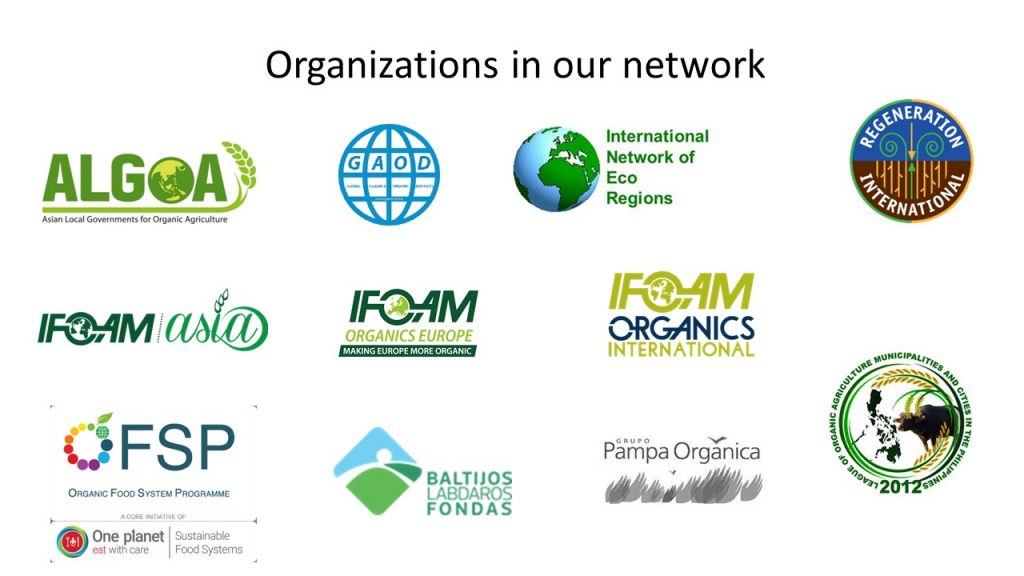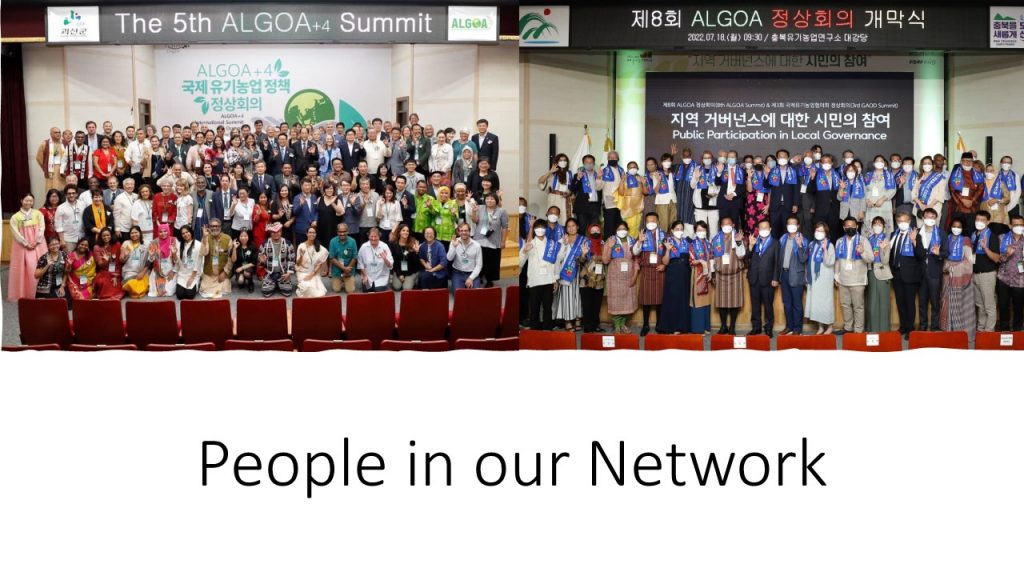
On 19 July 2022 during the second day of the ALGOA-GAOD Summits, in front of international delegates from 21 countries from Asia, Europe, Australia, the Pacific and Africa, in the 6th session ‘Moving Forward’ moderated by IFOAM Organics Asia President Mathew John, Prof. Ove Daniel Jakobsen from Nord University of Norway officially presented the Peoples Academy.
A precise reference to the Peoples Academy is also contained in the final declaration of the Summits:http://biodistretto.net/wp-content/uploads/2022/07/8th-ALGOA-3rd-GAOD-Summit-Declaration_final.pdf
It is a global transdisciplinary network and collaborative community of concerned scholars, researchers, educators, practitioners, farmers, creative artists, and others who offer courses to people world vide that inspire deep systemic change towards sustainable life-enhancing societies for humans, animals, and the whole nature. Peoples Academy is established as an integrated part of the common framework and guidelines for the development and implementation of Bio districts/Organic districts/Eco regions, etc. in Europe and globally.

VALUES OF PEOPLES ACEDEMY
• We are a global transdisciplinary network and collaborative community of concerned scholars, researchers, educators, practitioners, farmers, creative artists, and others.
• We offer courses to people world vide that inspire change towards sustainable life-enhancing societies for humans, animals, and the whole nature.
OVERALL AIMS OF PEOPLES ACADEMY
• The People’s Academy is taking an inclusive food system approach involving all actors from primary producers to consumers, governments, research, education and NGOs.
• It is giving a voice to the majority of the world’s small-holder family farmers and fisher and herding families, indigenous people, pastoralists and foresters who produce 75% of the food we eat.
• In due considerations of the achievements made by the partners of GAOD and the support to Bio districts by the European Commission and the European Committee of the Regions referred to above it is proposed to form the People’s Academy.
• We will gather groundbreaking research and science together with proven farmer-based practice and dietary patterns for food and nutrition security that are real world examples.
DYNAMIC DIALOGUES
• We offer courses based on values, ideas and knowledge to be transformed into action that stimulates the lives of all people and the whole ecosystem on our planet.
• To do this a frame of dialogue-based cooperation and shared values is needed.
• The courses are developed and run, in order to cultivate a relational climate characterized by dialogue, action, and qualitative development.
• Our relational approach offers a model of collaborative action that is constantly evolving and growing with the people involved.
BUILDING LEARNING NETWORKS
• The approach we are taking is to share common core principles, values, approach and messaging that flows into a universal understandable framework and basic activities of research and practice, so that globally we can become a unified, louder and more powerful voice for deep systemic change.
• But the intention is also to be flexible according to local context, to the resources available, priorities and goals.
• This allows a wide range of diversified initiatives to connect to each other strengthening their own identity but being able to co-create a global movement.


THEORY AND PRACTICE
People’s Academy is established as an integrated part of the common framework and guidelines for the development and implementation of Bio districts/ Organic districts/Eco regions etc. in Europe and globally.
The People’s Academy is building local learning network that consists of:
• Theoretical courses: A series of integrated courses within the areas of agriculture, food, economy, society and ecology
• Practical workshops: Local interactive processes developing and practicing organic knowledge.
THE COURCES IN PEOPLE ACADEMY
• A holistic approach that captures the dynamic interplay between economics, social, cultural and ecological dimensions
• Input and involvement from people from all 5 continents
• Providing a common structure for a learning network
• A format that is easily available and may be translated/transformed into all languages of the world
• Invites and involves indigenous people and what we can learn and together further develop from experienced knowledge
• Enhance interactions and cocreation at local level.
Learning outcomes: are descriptions of what the student is expected to know, understand and/or be able to demonstrate after completion of a process of learning.
Knowledge: larning outcomes always use an action verb.
Skills: explain, Express, Illustrate, Match, Select, Recognize, Compute.
General competence:
• The student is capable to participate, on a well-founded academic basis, in the public debate on the topics, challenges discussed in the course
• Students should be able to reflect critically on political, social and ethical dilemmas relevant for the course.
Examples of basic corses
BA 001: Transformative ecological economics for sustainable societies
The course stimulates students’ ability to develop new solutions rooted in ecological economics. Based on knowledge on basic concepts, theories, methods, and models in ecological economics the participants should be able to implement relevant applications of this knowledge on current topics relevant in the context of establishing and managing Organic Districts.
BA 002: Diet for a Green Planet
The course aims to provide a grounded understanding of the food system from farm to fork and how the food system is connected to climate change mitigation and eutrophication, support biodiversity, rural development, human health, and rural development.
The study unit will further develop an ability to suggest feasible and relevant methods to promote a transformation towards a sustainable food system
BA 003: IN.N.E.R: “Tool Kit” on what an Organic District is, guidelines on how to start and manage an Organic District and the evaluation with the “Monitoring Tool”
BA 004: Organic Regenerative Agriculture: Living soil, soil carbon, plant health, biodiversity
BA 005:Organic Food Systems, the 17 SDGs and Planetary Boundaries
Examples of elective courses
EL. 001: Dialogue methods for resilient local societies
The course focuses on various dialogue methods relevant for the participants in order to develop visions and concrete projects that lead to a sustainable, quality of life society that people wants to live in. Participation in the course leads to co-responsibility for implementation and results.
EL. 002: ALGOA : A variety of Organic Foundation Courses
EL. 003: School Meals and Public Procurement
EL. 004: Food Quality and Health (tbc)
EL. 005: Sustainable Tourism
Instead of asking How the future will be?
We should ask How we want the future to be?
Info:
Salvatore Basile – presidente@ecoregions.eu (in Italian and English)
Prof. Ove Daniel Jakobsen – ove.d.jakobsen@nord.no (in Norwegian and English)
Jostein Hertwig – jostein.hertwig@gmail.com (in Norwegian, Swedish and English)
